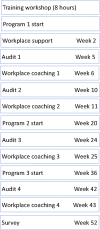Evaluation and facilitation of intervention fidelity in community exercise programs through an adaptation of the TIDier framework
- PMID: 32000776
- PMCID: PMC6993417
- DOI: 10.1186/s12913-020-4919-y
Evaluation and facilitation of intervention fidelity in community exercise programs through an adaptation of the TIDier framework
Abstract
Background: Despite high quality evidence supporting multiple physical and cognitive benefits of community-based exercise for people after stroke, there is little understanding on how to facilitate uptake of these research findings to real-world programs. A common barrier is a lack of standardised training for community fitness instructors, which hampers the ability to train more instructors to deliver the program as it was designed. Scaling up program delivery, while maintaining program fidelity, is complex. The objective of this research is to explore novel use of the Template for Intervention Description and Replication (TIDier) framework to evaluate and support implementation fidelity of a community exercise program.
Methods: We embedded intervention fidelity evaluation into an inaugural training program for fitness instructors who were to deliver the Fitness and Mobility Exercise Program for stroke, which has established efficacy. The training program consisted of a face-to-face workshop followed by 3 worksite 'audit and feedback coaching cycles' provided over 3 iterations of the 12-week program offered over 1 year. A modified TIDIER checklist (with 2 additional criteria) was used within the training workshop to clarify the key 'active ingredients' that were required for program fidelity, and secondly as a basis for the audit and feedback process enabling the quantitative measurement of fidelity. Data were collected from audits of observed classes and from a survey provided by fitness instructors who implemented the program.
Results: We demonstrated the feasibility of the TIDier checklist to capture 14 essential items for implementation evaluation of a complex exercise intervention for people with chronic health conditions over 3 iterations of the program. Based on the audit tool, program fidelity was high and improved over time. Three content areas for workplace coaching (intensity monitoring, space, and educational tips) were identified from the audit tool and were addressed.
Conclusion: Training of staff to deliver exercises to high need populations utilising workshops and workplace coaching that used the TIDier framework for training, onsite audit and feedback resulted in a high level of fidelity to the program principles. A novel checklist based on the TIDier framework was useful for embedding implementation fidelity in complex community-based interventions.
Keywords: Adaptation; Evaluation; Fidelity; Framework; Implementation; Program; Scale-up.
Conflict of interest statement
The authors declare that they have no competing interests.
All authors have contributed to this manuscript and have read and approve the final copy.
References
-
- Merali S, Cameron JI, Barclay R, Salbach NM. Characterising community exercise programmes delivered by fitness instructors for people with neurological conditions: a scoping review. Health Soc Care Community. 2016;24(6):e101–e116. - PubMed
-
- Council, M.R . A framework for development and evaluation of RCTs for complex interventions to improve health London. 2000.
-
- Gearing RE, El-Bassel N, Ghesquiere A, Baldwin S, Gillies J, et al. Major ingredients of fidelity: a review and scientific guide to improving quality of intervention research implementation. Clin Psychol Rev. 2011;31(1):79–88. - PubMed
Publication types
MeSH terms
Grants and funding
LinkOut - more resources
Full Text Sources
Medical


